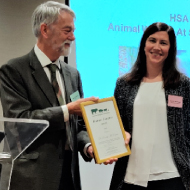
Dr Dorothy McKeegan receives the 2019 Humane Slaughter Award
A senior lecturer in animal welfare and ethics has been given a special award for her research to improve the welfare of farm animals.
Dr Dorothy McKeegan from the University of Glasgow received the 2019 Humane Slaughter Award for her groundbreaking work into the welfare impacts of controlled atmosphere stunning (CAS), as well as her contribution to protecting animal welfare at slaughter.
She received the award on Wednesday (9 October) at the Humane Slaughter Association’s (HSA) conference, during which she presented a paper on Low Atmospheric Pressure Stunning (LAPS) for poultry in pigs.
Professor Malcolm Mitchell, who nominated Dr McKeegan for the award, said: “She is an inspirational scientist, in a demanding area of research, motivating and training the next generation of scientists to work in this challenging field.”
Dr Robert Hubrecht, chief executive and scientific director of HSA added: “Collectively, Dr McKeegan’s work represents an outstanding and sustained contribution to the field of animal welfare at the time of killing. Her research has had significant real-world impacts, with ongoing influence both practically and in policy development.”
Dr McKeegan’s extensive research career has focussed on welfare at slaughter or killing, combining behavioural approaches with physiological and neurophysiological techniques.
She pioneered the first comprehensive research into the welfare impacts of CAS and her findings had a substantial and international influence on poultry welfare. Indeed, they directly informed the choice of permitted gas mixtures for the killing of poultry in the EU.
More recently, Dr McKeegan was invited to lead an international research team carrying out a welfare assessment on LAPS and was instrumental in producing an application to the European Commission to allow its use in poultry.



 The Federation of Independent Veterinary Practices (FIVP) has announced a third season of its podcast, Practice Matters.
The Federation of Independent Veterinary Practices (FIVP) has announced a third season of its podcast, Practice Matters.